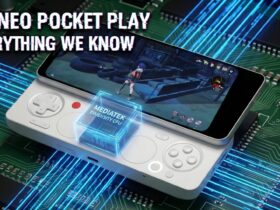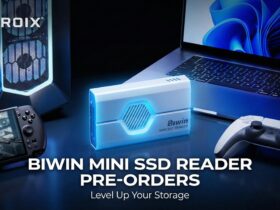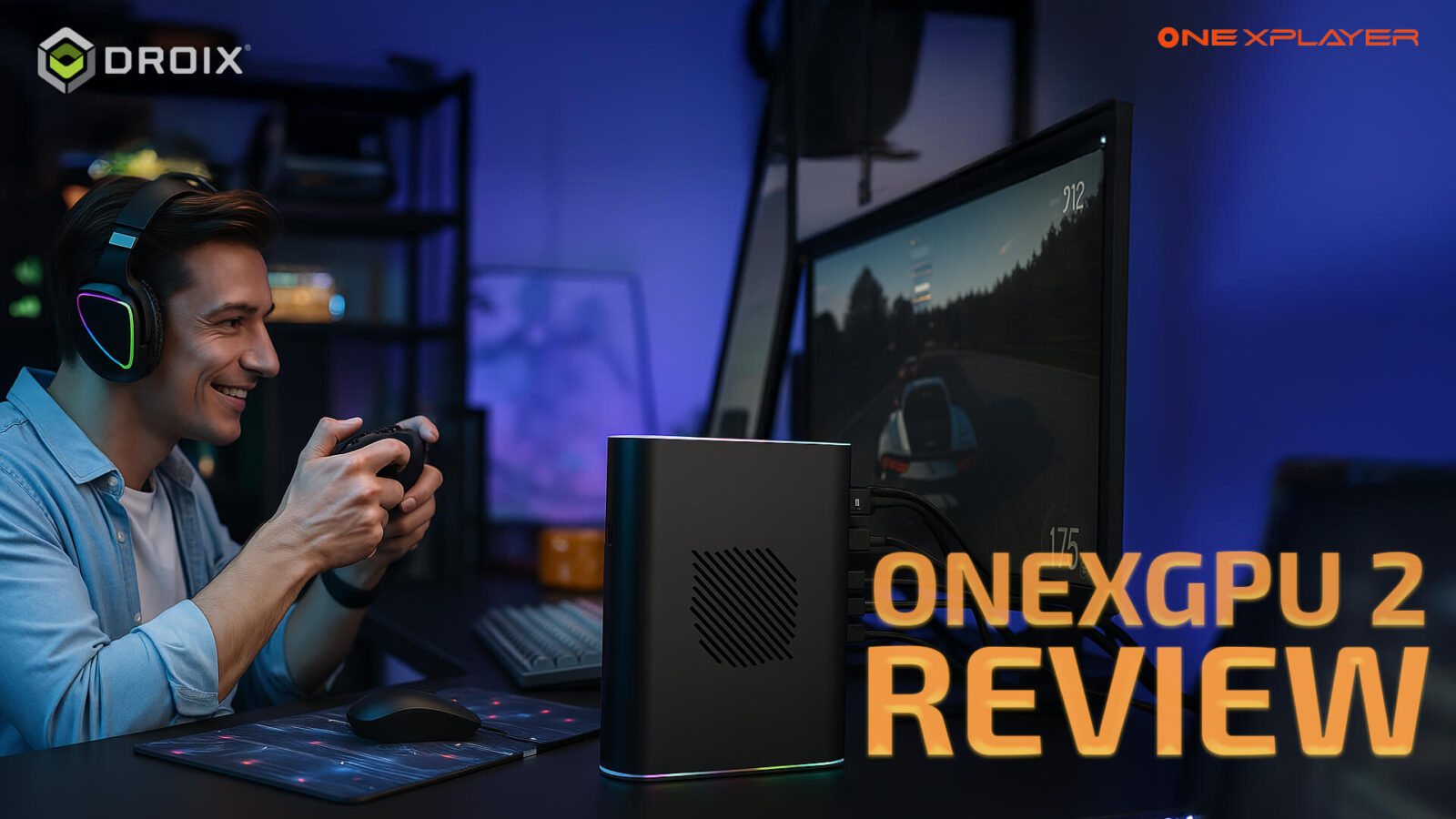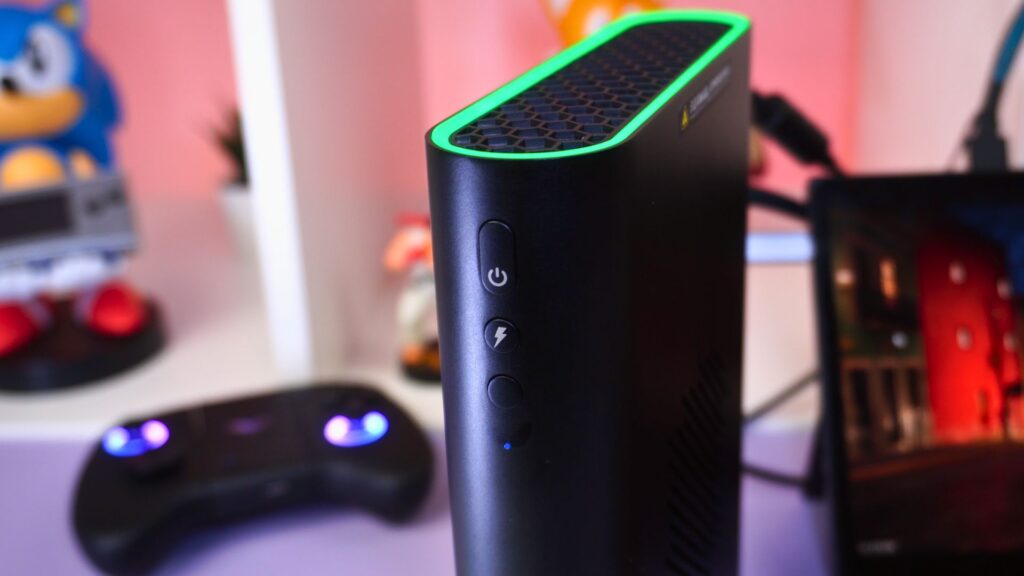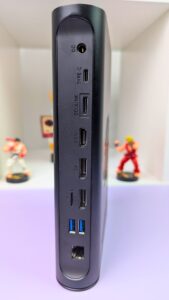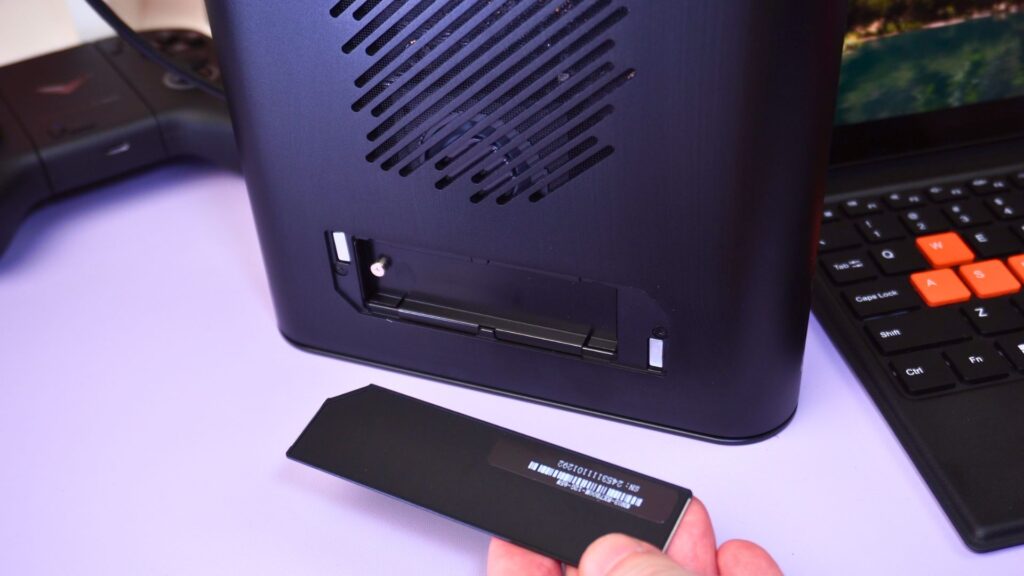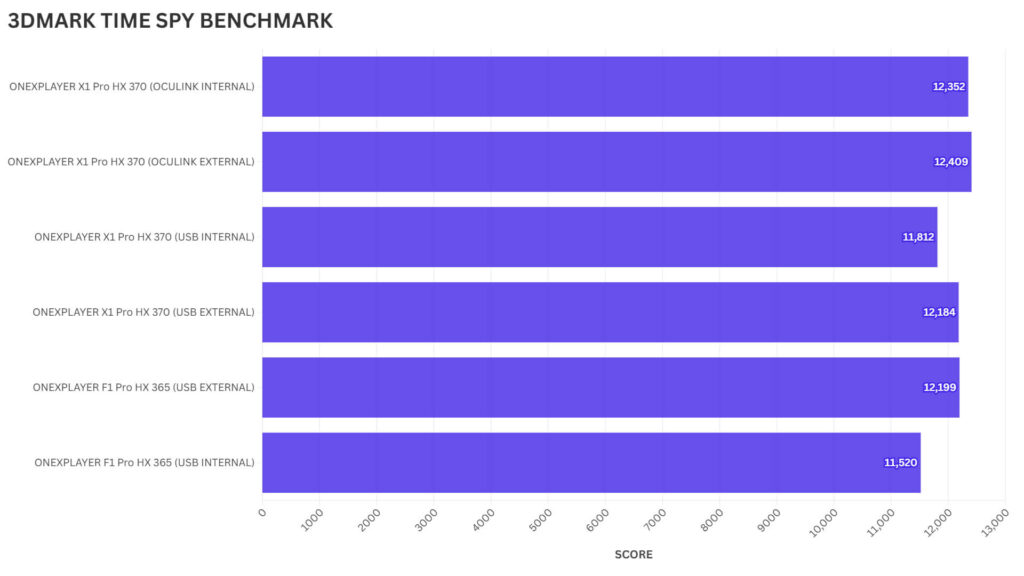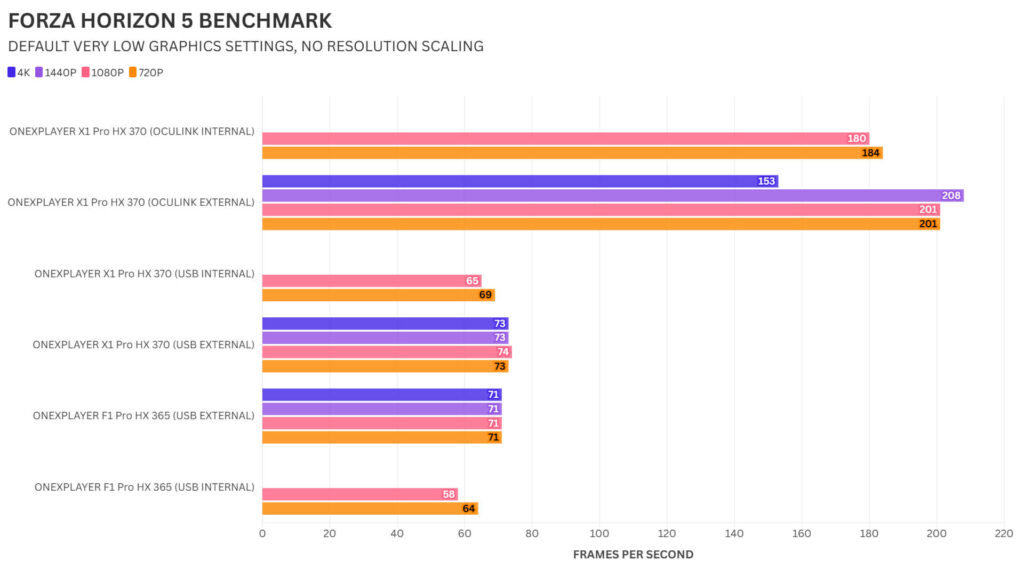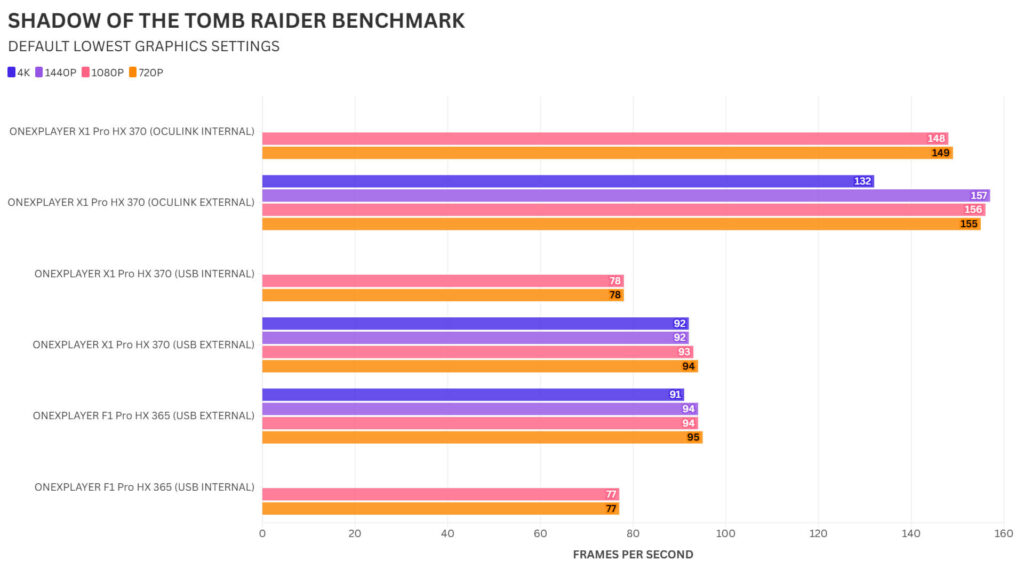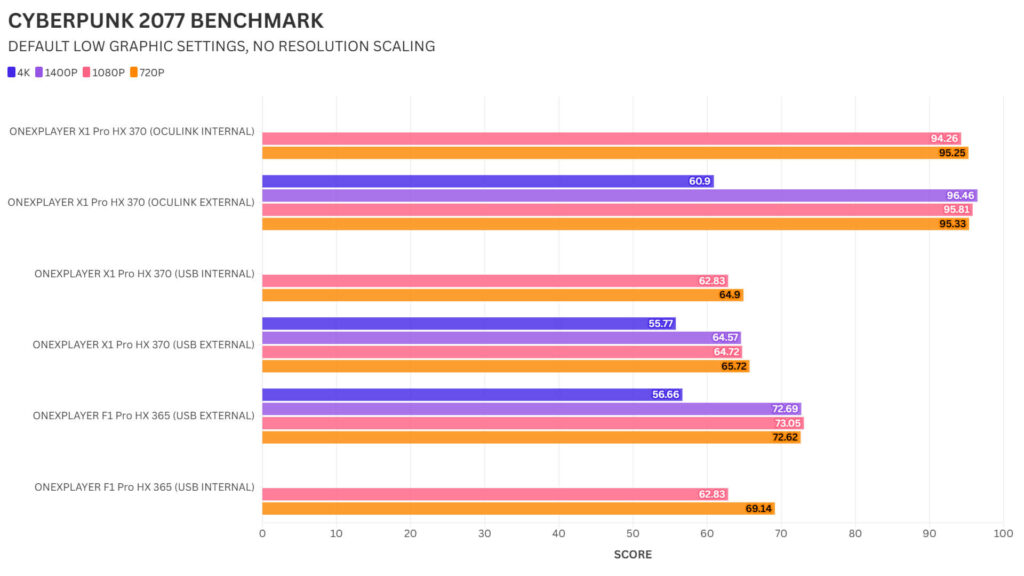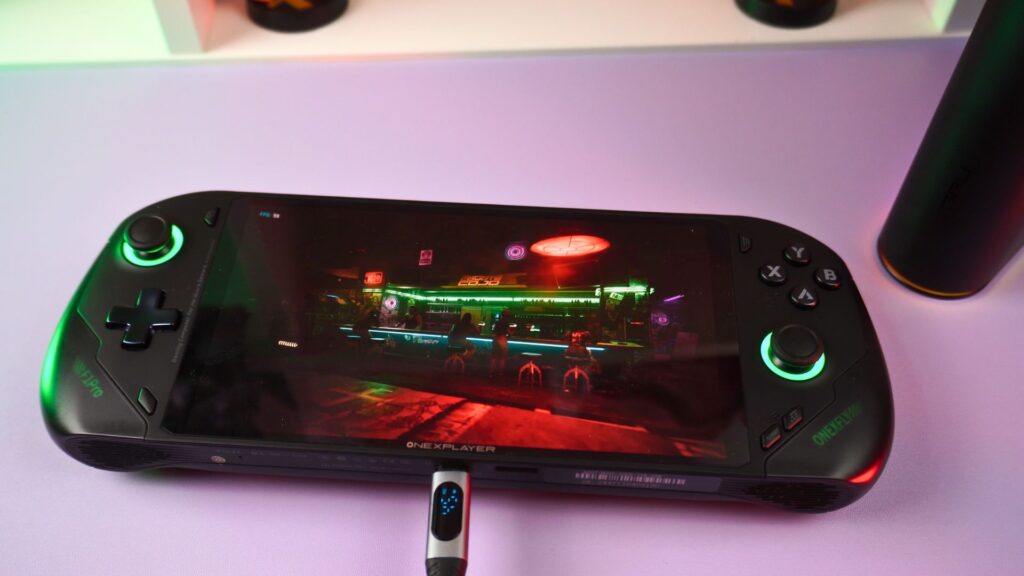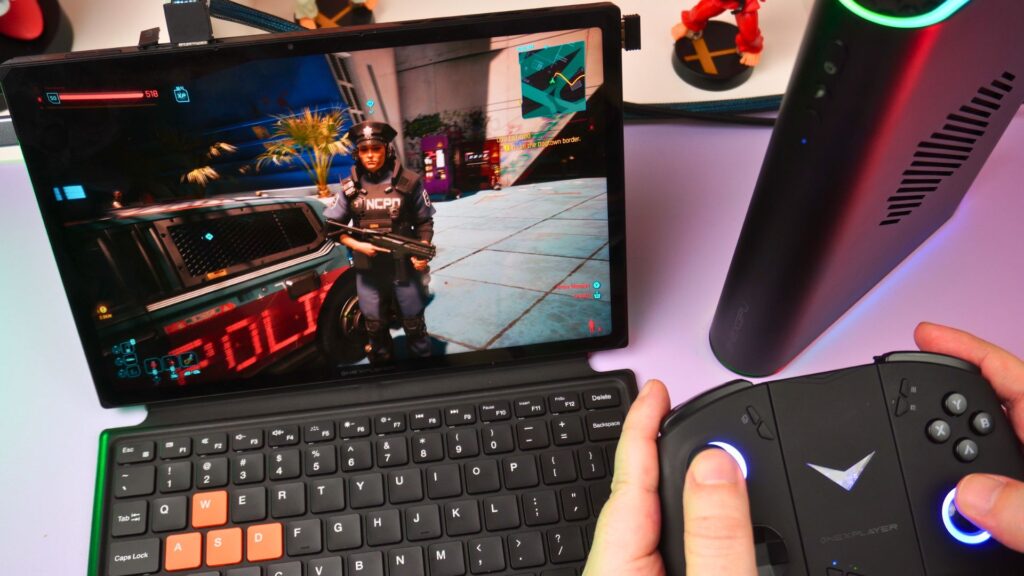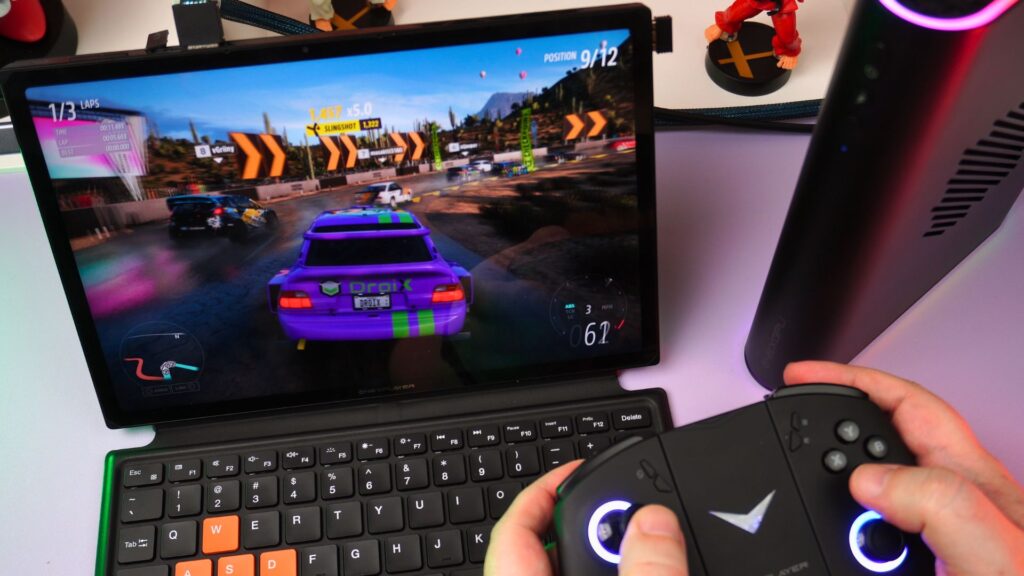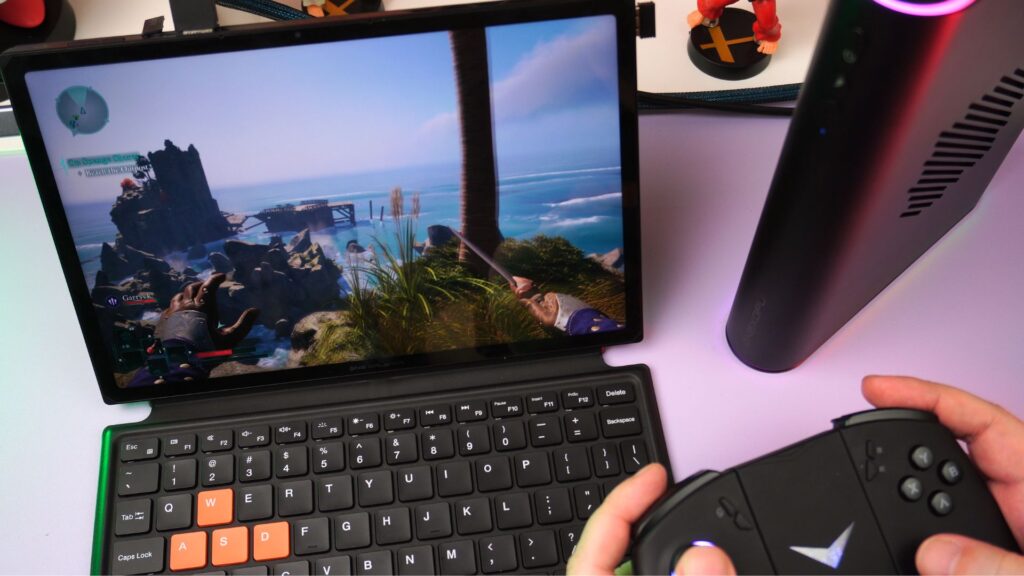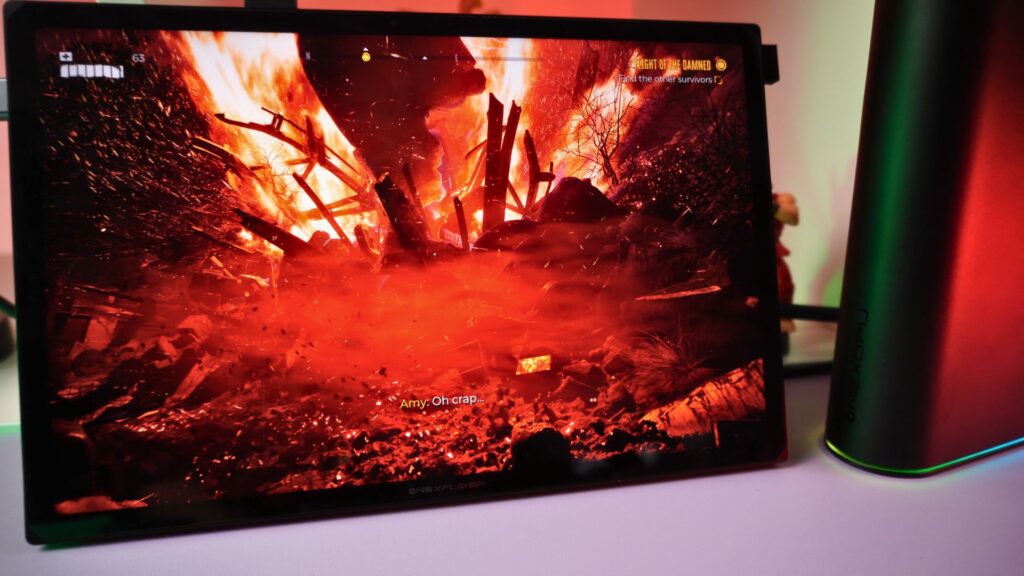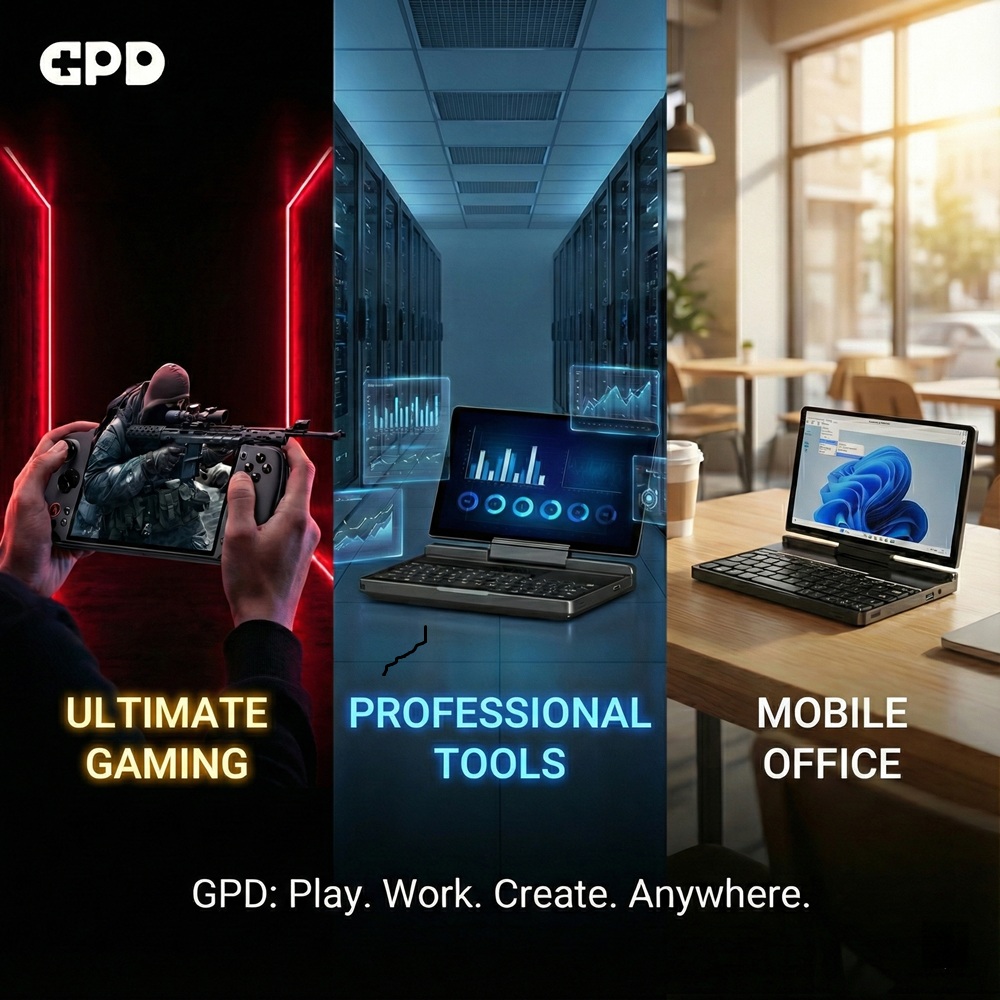ONEXPLAYER ONEXGPU 2 Review
-
Design
(4.5)
-
Build Quality
(4.5)
-
Performance
(5)
-
Features
(4.5)
Summary
The ONEXPLAYER ONEXGPU 2 delivers powerful gaming performance with the AMD Radeon RX 7800M, 12GB GDDR6 RAM, and expandable storage,
Overall
4.6User Review
( votes)Pros
- High performance AMD Radeon RX 7800M GPU
- OCuLink and USB 4 connectivity
- Additional USB, Ethernet, HDMI and DP output
- SSD slot for extra storage
- Vertical orientation to save space
Cons
- Large PSU compared to internal ones
External GPU docking stations have surged in popularity, offering a powerful way to boost gaming performance on handhelds, mini PCs, and desktops. The ONEXPLAYER ONEXGPU 2 aims to build on its predecessor by upgrading to the AMD Radeon 7800M, promising improved performance and expanded connectivity. But how much of a difference does it really make? And is it the right upgrade for you? Let’s take a closer look and find out in our ONEXPLAYER ONEXGPU 2 review.
ONEXPLAYER ONEXGPU 2 Review Video
ONEXPLAYER ONEXGPU 2 Overview
We start our ONEXPLAYER ONEXGPU 2 review with a look at the eGPU docking station itself. The ONEXPLAYER ONEXGPU 2 measures around 9.03 x 6.8 x 1.6 inches (22.9 x 17.5 x 4.3 cm) and weighs around 1.6kg (3.5lbs) without the power supply, 2.3kg with the power supply. The ONEXGPU 2 stands upright to take up less desk space. On the front is a power button, turbo button and a RGB mode cycle button.
The Turbo button switches between the default 180W down to 130W. This is useful if you want a quieter fan noise for example. he RGB button cycles through different light modes that are on the top and bottom areas of the ONEXGPU 2.
On the back, from top to bottom, are the power supply connector, a USB-C 4 and OCuLink port for fast data transfer. Next we have a HDMI 2.1 and two DisplayPorts 2.0 for output up to three TVs or monitors. Beside the second DisplayPort is a micro SD card reader, and below two USB-A ports, finishing off with an ethernet port.
On the left side below the fan grill is a removable cover held by magnets where you can install your M.2 NVMe PCI-E Gen 3.0 SSD for extra storage.
And a brief look at the power supply as it’s a big boy! It measures around 4.7 x 3.7 x 1.1 inches (12 x 9.5 x 3 cm), not including the plug type, or you can use a kettle plug lead instead. It is a 330W GaN charger, which not only powers the ONEXGPU 2, but can also charge your device up to 65W. Having the power supply external to the ONEXGPU does help with the temperatures, but also means something extra to carry if on the move.
ONEXPLAYER ONEXGPU 2 Technical Specifications
As part of our ONEXPLAYER ONEXGPU 2 review we take a look at the technical specifications as well as perform our own fan noise and temperature tests.
| GPU | AMD Radeon RX 7800M |
| ARCHITECTURE | Navi 32 |
| RAM | 12GB GDDR6 |
| FREQUENCY | 2145MHz |
| STREAM PROCESSORS | 3840 |
| COMPUTE UNITS | 60 |
| RASTER UNITS | 96 |
| PEAK HALF PRECISION COMPUTE PERFORMANCE | 71.73 TFLOPs |
| PEAK SINGLE PRECISION COMPUTE PERFORMANCE | 35.84 TFLOPs |
In our fan noise and temperature tests we run these with Forza Horizon 5 on an external monitor at 4K Extreme graphics settings to really push the hardware at 180W. We got a highest temperature of 60 °C, and highest fan noise of 65 dB. We didn’t see much difference at 130W as a note.
Benchmarks
We could not do a ONEXPLAYER ONEXGPU 2 review without some benchmarks. We will skip the usual CPU based benchmarks and concentrate on ones for GPU. We will be using the ONEXPLAYER X1 Pro with HX 370 CPU which has an OCuLink port. And the ONEXFLY F1 Pro with HX 365 CPU with USB only. We have included benchmark results for internal and external displays, as well as with and without OCuLink connectivity on the X1 Pro, to see the differences in performance.
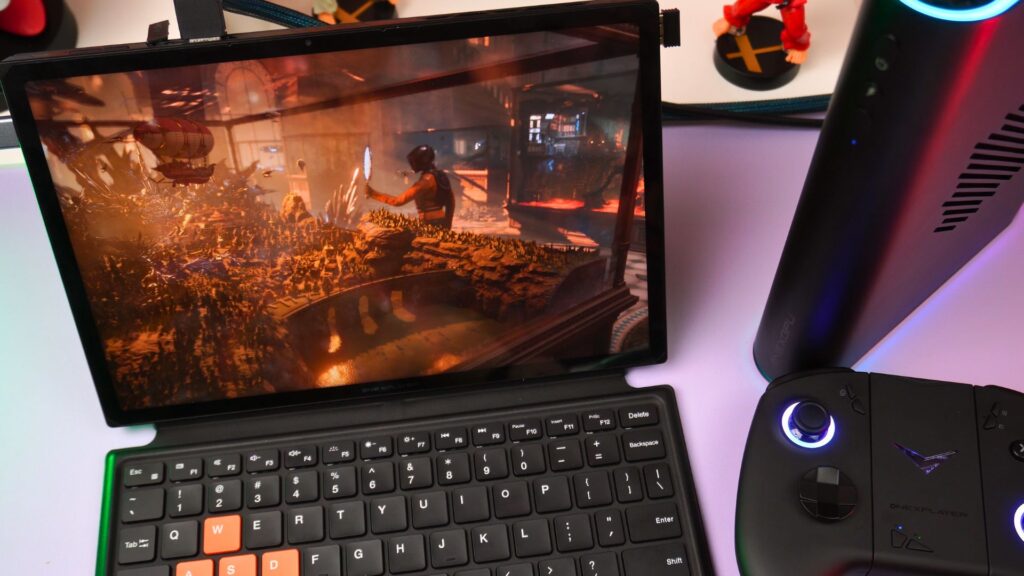
3DMARK
We will start with our usual 3DMARK Benchmark tests, Time Spy, Night Raid and Fire Strike. In Time Spy, we see the X1 Pro via OCuLink naturally take the lead, with USB falling behind. The F1 Pro does quite well here with good results over USB only.
On Night Raid we see more of a mix of results. With the F1 Pro you can see the difference between internal and external displays as well as with OCuLink and USB. And the F1 Pro on external display surprisingly takes the top spot in the scores here.
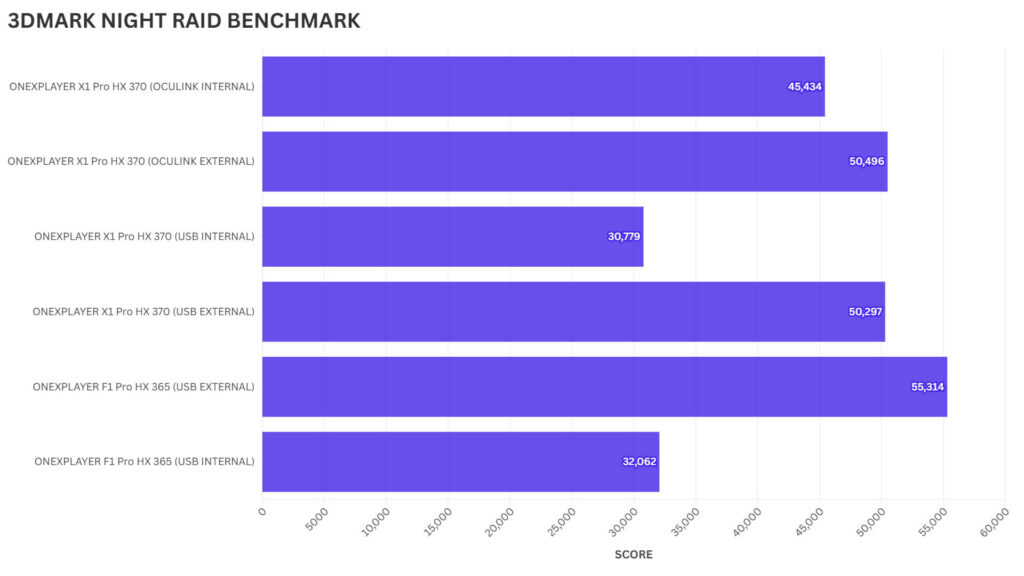
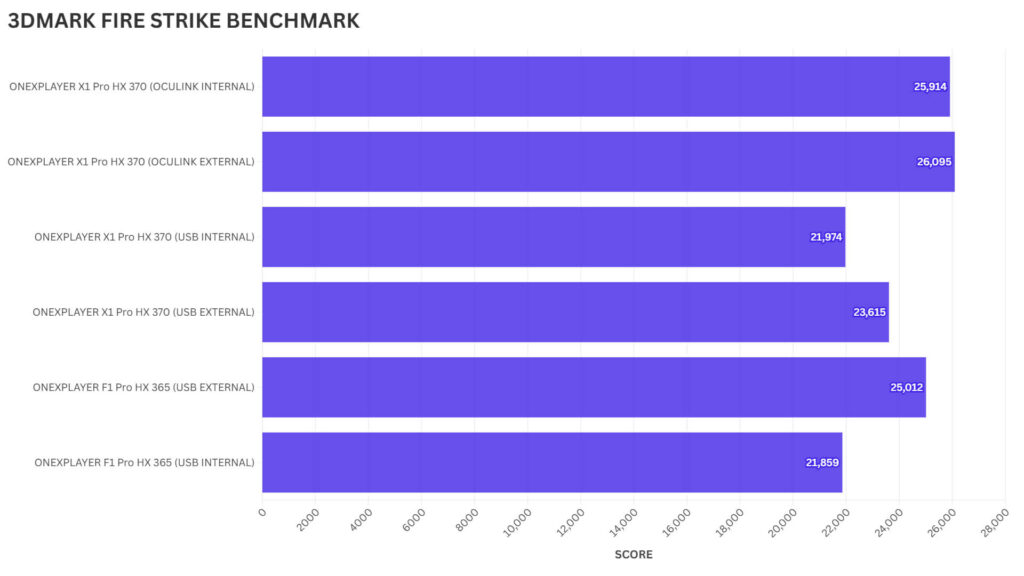
For the Fire Strike benchmark, the results are a bit closer. The X1 Pro leads again via OCulink, with a drop in performance via USB only. And the F1 Pro via USB does fairly well across the different tests.
Forza Horizon 5
It is when we run some game benchmarks we can see the advantages of OCuLink over USB only connections. The X1 Pro with OCuLink enjoys a massive boost in performance across the tests. While connected via USB only, we can see for both devices there are very close frames per second, limited by the bandwidth of USB 4.
Shadow of the Tomb Raider
For Shadow of the Tomb Raider we see the same pattern with the X1 Pro via OCuLink. It has a massive boost in performance compared to USB only. We see similar scores again with USB on their relative tests for both devices.
Cyberpunk 2077
And our final benchmark is for Cyberpunk 2077. We see good scores for the X1 Pro via OCuLink, though a noticeable drop at 4K on the external monitor. And for the F1 Pro via USB we see expected scores in line with the X1 Pro USB scores.
Benchmark Summary
The ONEXPLAYER ONEXGPU 2 as we saw is great for performance, but we do see some bottlenecks when using USB 4 only. The USB 4 bandwidth is not enough to keep up, and we see a large gap in performance compared to OCuLink. On the original ONEXPLAYER ONEXGPU eGPU docking station, the gap was not quite as large as the GPU had less performance, but there was still a bottleneck. We actually got quite similar scores via USB 4 on both devices due to this.
However, when connected via OCuLink we see higher scores than the 7600M GPU. For example at 4K on Forza Horizon 5 we see around a 38% difference in performance. Lower resolutions will be similar between the two, but if you increase the graphics quality you would see the gap between them grow rapidly.
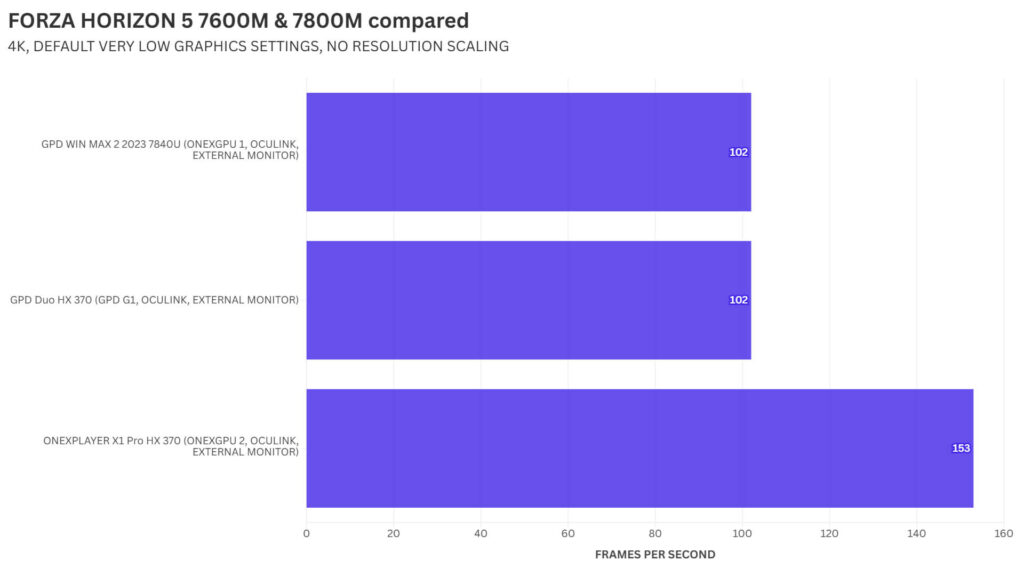
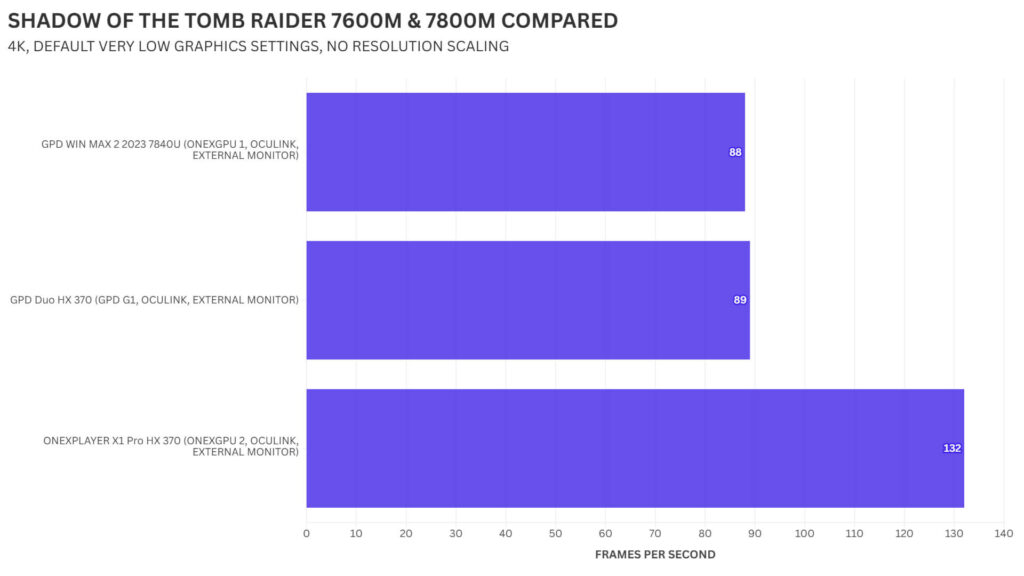
You can learn more about both handhelds we used in this review; ONEXPLAYER X1 Pro review & ONEXPLAYER F1 Pro review.
Game Performance
Benchmarks are all very good but what about actual real world gaming. We will take a look at some of the more demanding games. For this we are using the ONEXPLAYER X1 Pro with an OCuLink connection at 1600P resolution.
Cyberpunk 2077
If you want a solid 60+ frames per second then we went with 1600P on the default Ray Tracing Low graphics settings, with High Texture Quality, and AMD FidelityFX Super Resolution 2.1 set to Auto.
Forza Horizon 5
For a solid 60+ frames per second we went with 1600P on the default Extreme graphics settings. A nice and easy setup for this game
If you have a higher refresh rate on your display, say 120Hz with the X1 Pro. Then we can go with 1600P Medium graphics. Or you could drop to 1200P and go with High graphics if you prefer.
Avowed
Another quick one for 60+ FPS. We went with 1600P on the default Epic graphics settings, with Ray Tracing switched on and NVIDIA DLSS 3 set to Quality.
Final Thoughts
Let’s sum up our thoughts on the ONEXPLAYER ONEXGPU 2 review. The ONEXPLAYER ONEXGPU 2 is a great addition for handheld, mini or desktop PC owners, with some conditions. Let’s sum up why.
The form factor may appear as very large, but if you compare it to a graphics card it is mostly larger by depth. You also have the convenience of it standing rather than flat on your desk which takes up less space.
Also consider it’s not just a graphics card inside. You have a full dock accessory set up here, with support for up to three external displays, two additional USB ports, ethernet port and a SSD slot for extra storage. So the extra size compared with a standard GPU makes up for it here.
The performance is the most important factor. We see higher performance than the previous generation ONEXGPU. When OCuLink is used, we see increased performance of around 50% from 103 to 153 FPS on Forza Horizon 5 at 4K when compared to the older 7600M.
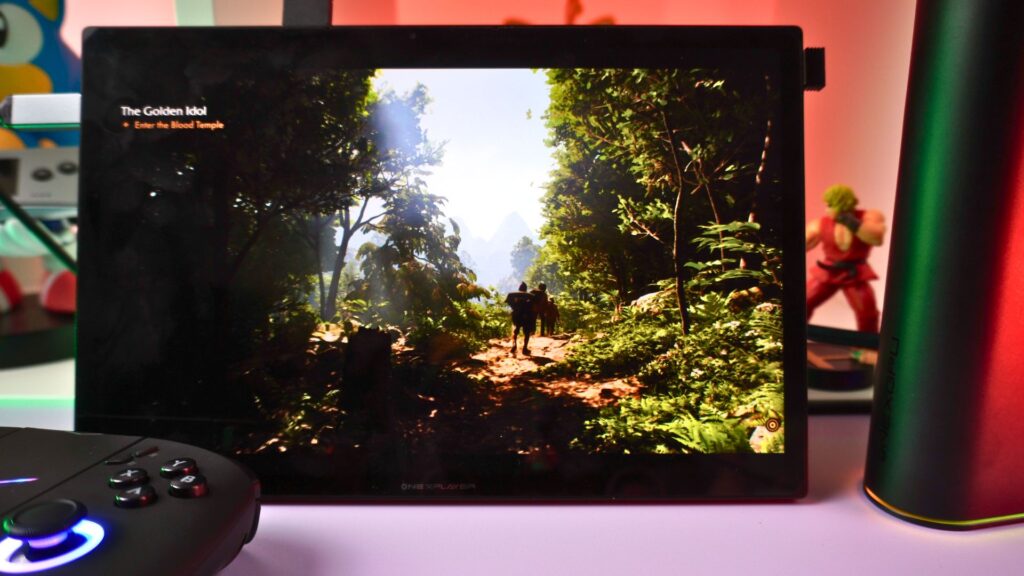
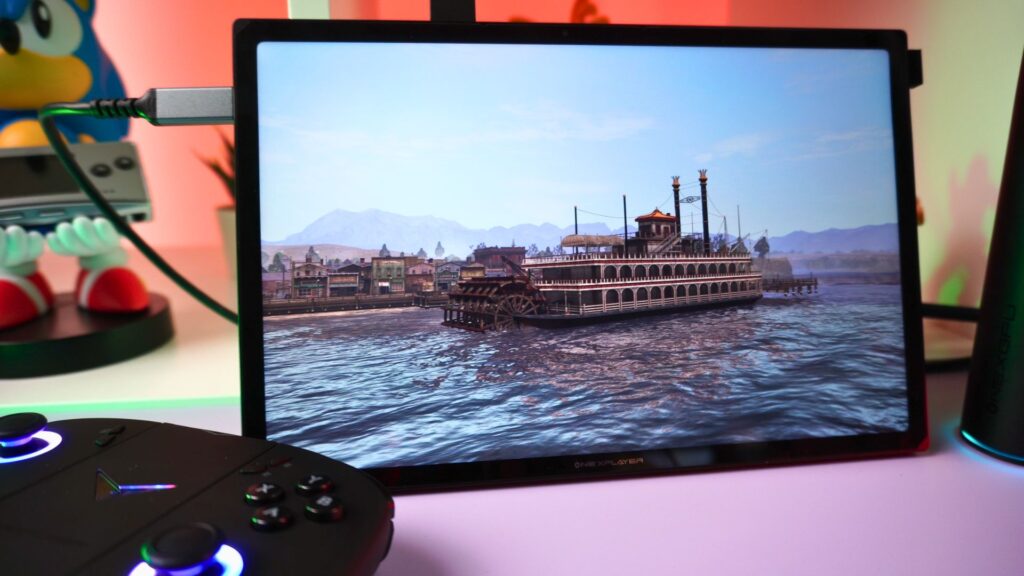
However, if your device does not support OCuLink, you won’t be able to take full advantage of the ONEXPLAYER ONEXGPU 2 performance due to the bandwidth limitations of USB 4. In some cases, this can result in large performance drops. For example, in Forza Horizon 5 at 4K, we recorded 208 FPS with an OCuLink connection, but only 73 FPS over USB 4. If you plan to use USB 4 exclusively, the performance difference compared to the previous 7600M model is much smaller, making it a more cost-effective choice.
With all of this in mind, if you have or are planning to get a device with OCuLink, then the ONEXPLAYER ONEXGPU 2 is an excellent option. You have the fastest possible connection for graphics performance, multiple video outputs, ethernet and an SSD slot for more storage. This is definitely one to consider!
That wraps up our ONEXPLAYER ONEXGPU 2 review, we hope you have found it useful. If you do have any questions about it please feel free to ask in the comments and we will be happy to help.




